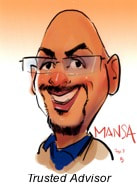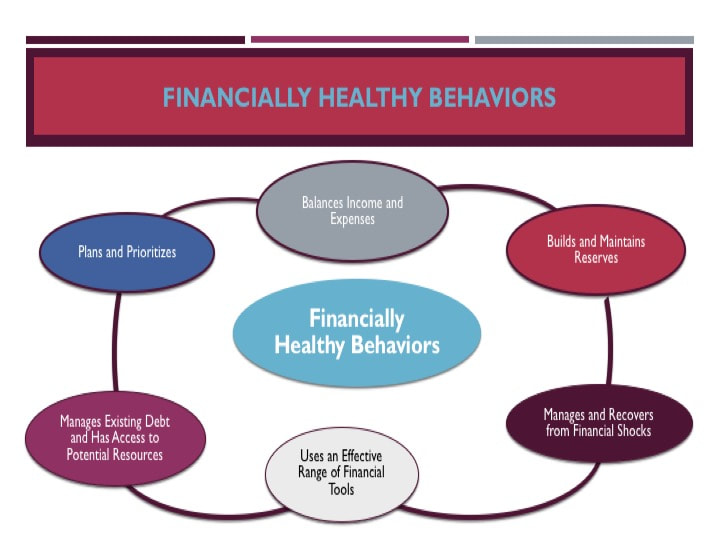Archives
May 2020
Categories
All
|
Back to Blog
COVID-19 and Estate Planning3/30/2020 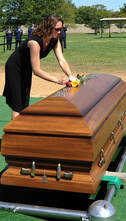
The mortality projections from the COVID-19 virus range from a low-ball, happy-talk 100,000 to an alarmist 2.8 million. That is a lot of death. The majority of Americans will have first-hand knowledge of someone in their social network who grieves for a COVID-19 casualty. Whatever the number, a lot of people will die from the pandemic. Their deaths will be added to the 2.8 million people who die annually in the United States.
Dead people leave estates. Everyone leaves an estate no matter how meager. For most working-class people, their estate consists of stuff and people. The people are your family and friends. Stuff is all you’ve accumulated in your life regardless of value. An estate plan gives you a final say. Planning for death isn’t widespread. A majority of Americans will die without an estate plan. The reasons are varied:
Some people superstitiously believe that planning for death brings it on quicker. Sooner or later does matter, but die you will. And dying without an estate plan from this pandemic or of natural causes in the next century will cause confusion and unnecessarily burden your family. The lack of an estate plan forces your family through the strain of the probate court.
The real purpose of an estate plan is to provide peace of mind and give you a sense of accomplishment. The majority of Americans desire an estate plan.
An estate plan is part of a MoneySmartLife. The COVID-19 pandemic reminds us of the need to get or update ours now. Admittedly, there is a knowledge gap when it comes to estate planning for most. You have to close your gap of knowledge on this. Informing yourself will help you help your family, friends, and yourself successfully deal with this fact of life during these times of high anxiety. Being informed will make your interactions with estate and financial planning professionals more fruitful.
The pandemic offers the opportunity to address estate planning with your social network. Parents should be especially aware of estate plans regarding minors. Unresolved custody issues can be extremely volatile and detrimental to relationships and finances. COVID-19’s virulent infectious nature requires those that die, must often die alone. There will be no bedside visits and last wishes. Discuss, then codify your desires with your family now. Once your estate plan is handled, encourage others in your social network to do the same. Everyone should have an estate plan, even more so the vulnerable during the COVID-19 pandemic. Although a necessary expenditure, the cost of having an estate plan prepared has been an impediment to some. In most cases, the advice and counsel of estate-planning attorneys and financial planners should be sought. But in this emergency, a simple online estate plan is better than no plan at all. Dying intestate can be catastrophic to your estate and final wishes. After you have your emergency online estate plan, resolve to keep it updated with the help of qualified professionals as the seasons in your life change. I am calling for free or heavily discounted simple estate plans from the top 8 best online will makers in 2020 during the pandemic. The estate plan would include a Last Will & Testament, Power of Attorney, and Living Wills. If Americans would create and update their estate plans, it will prevent an overwhelming surge of pandemic death cases to probate court dockets. Having an estate plan is a necessity for everyone. Shielding your loved ones and property from courts, taxes, wounding quarrels, etc. is your plan’s goal. Make one today. Don’t worry about it being perfect. It can be changed later. Regardless of age, create or update your estate plan now.
0 Comments
Read More
Back to Blog

The coronavirus mitigation protocols have forced many people to stay indoors. Here are some tasks you can do to improve your financial situation during this time. These tasks are not for the financially desperate or food insecure. Instead, it is for those that have a level of sustainability at the beginning of the COVID-19 protocols. (Checkout 10 MoneySmartLife Coronavirus Strategies in a previous post on this site.) Here are the 7:
1. Work on that business plan. No longer will you have to serve your greedy corporate overlords. There will be opportunities after the coronavirus economic carnage is over for new businesses. Do the work on your plan now that you claimed you never had the time to do. Get serious about your dreams. Put them on paper. 2. Increase your cash on hand and limit your trips to ATMs. Money is always good to have available, especially during times of economic dislocation.
3. Move money to more secure liquid accounts. From certificates of deposit to a savings account or from a brokerage money market fund to an FDIC insured one. Interest rates are low across the board right now. So safety may be a more critical consideration than an incremental higher interest rate at this time. 4. Take your insurance game to the next level.
5. Organize your financial records.
6. Spend time daily, increasing your financial intelligence. Make a concerted effort to learn more about your money and the best ways to handle it.
7. Relax, don’t panic. There is no need to hoard items or cash out your 401(k). Things will be rough for a while, no doubt. But it will settle down. When it does, many opportunities will abound for those prepared to seize them. Make the best of this stay-in period for yourself, your family, and money by implementing the above ideas. You might not be able to do them all, but you can do some.
Back to Blog
 Income & Expense Volatility Income & Expense Volatility
One of the four financial health influencers is the volatility of income and expenses. Households impacted by such volatility find it difficult to achieve financial well-being. Increased expenses or reduced income often dictate tough lifestyle choices and increase stress levels beyond chronic. When there is increased income or reduced expenses, there is a less problematic increase in household discretionary funds and the fun that goes with it. Seasonal workers, those on fixed incomes, or subject to inconsistent hourly work schedules are especially vulnerable to this type of volatility.
These financial shocks can have a devastating effect. Income and expense volatility does not have to impede your pursuit of 6 Financially Healthy Behaviors. Volatility can be mitigated by preparing for it. John F. Kennedy once said, “The time to repair the roof is when the sun is shining.” Please don’t wait for it to rain before you prepare. One cause of volatility is “stuff happens.” Happens to everybody. No one is immune. To achieve financial well-being, you need to possess the “capacity to absorb financial shocks.” Economic setbacks can be self-inflicted or come from external sources. The future economy will be disrupted by geopolitical, weather, or cyberattack events. It is essential to be able to manage and recover from the inevitable financial shocks. Every household should have a disaster recovery plan. The foundation of a financial recovery plan is the Emergency Fund, the “liquidity buffer” between you and ruin. Building an emergency fund is your #1 priority, no matter your age. You should well establish an emergency fund before you divert resources to a debt reduction strategy. Emergency funds are highly individualized. Sufficiency depends on a variety of factors, including your health, your age, your temperament, dependents, housing situation, the stability of your job, your risk tolerance, and more. Just be mindful of the truism, “It’s better to have money and not need it; than to need it and not have it.” Your emergency fund can’t be too big. Its size may determine how it is stored but not its existence. 4 Ways to Jumpstart an Emergency Fund
Being able to deal with income and expense volatility successfully requires preparation. The base of that preparation is an emergency fund. Start or grow yours now.
Back to Blog
Continuing Series on the 6 Financially Healthy Behaviors Often when it comes to money some of our behavior can subconsciously be influenced by our money habitudes or by one or more of the four external financial health influencers. This can result in frustration and missing your money goals. Money is like food in a lot of ways. It is something that we consume and is necessary to live. Just as improper behavior in relation to food leaves you in ill-health; an improper relationship with money can prevent financial well-being. Crash diets and get rich schemes may provide short-lived results but without a fundamental behavior change the results will not last. Here are 6 financially healthy behaviors working-class households can use in the journey to financial well-being. These 6 financially healthy behaviors will increase your financial capabilities and lower your money stress. In no particular order of importance, the first financially healthy behavior is “uses an effective range of financial tools.” 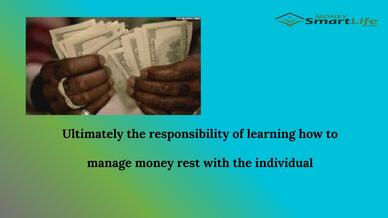 Ultimately the responsibility of learning how to manage money rest with the individual Ultimately the responsibility of learning how to manage money rest with the individual
Since hominids roamed the Rift valley into the plains of Africa, effective use of tools gives a person the ability to alter an environment for their benefit. That is true for your money environment also. Each household operates within a larger economy. That larger economy creates an environment ranging from wholesome to toxic that generates irresistible forces that impact households. Altering that environment for your benefit through the effective use of some financial tools will help you succeed in your financial evolution.
Credit cards are a necessary part of life in 21st century America. They can be a bane or a blessing depending on ownership. By that I mean, “Do you own your credit cards or do your credit cards own you?” A well-managed credit card can provide increased monthly cash flow and lifestyle enhancements through rewards and other cardholder benefits. Cash advances can also be used as part of a last resort safety net or emergency fund. Credit cards should be proactively managed for rewards, utilization ratios, and annual limit increases. Poorly managed credit cards lead to high-interest rate debt, stress, and a diminished lifestyle. This is like using a tool on yourself instead of on your circumstances. This is what happens to the undisciplined money managers and impulsive spenders. If this is your situation, there is hope. You don’t have to stay that way. Everyone engages with the economy through Financial Services. These services and products are sold by a variety of entities. Accessing these services requires both prudence and due diligence. Buyer beware! There are many “trick and trap” instruments promoted to the ill-informed and desperate. Loans of all types can have such terms: Payday, Title, Student, Mortgage, Auto, etc. Strategically accessing capital when you need it is a good thing. Of course self-funding, though not always possible, would be the best course. There is nothing wrong with borrowing. But do so when it is the only option left. Borrowing should never be your first option. Do you really need to borrow? What are the terms? Can you maintain the payments even if your income is reduced? Checking/Savings accounts are necessary to engage the economy. These deposit accounts give you access to cash and the ability to make payments. Your deposits are held securely until you access them through cash withdrawals, debit cards, wire transfers, or ATMs. Lack of access to these basic services has left many “unbanked” at the mercy of the unscrupulous and greedy. Those that do have access must be ever vigilant of fees and other balance reducing charges that are profit centers for some financial institutions. Continuous financial education must be a value that you fully embrace. Thanks to Google, YouTube, MoneySmartLife.org, and a plethora of financial websites and books you can always be informed about your money. Being informed will help you make better decisions and plan for success. You don’t have to be an Accountant per se, but you should be fluent enough to discuss your situation with one. Be aware when consuming financial information of its source and affiliations that may result in bias or steering. Look for objective sources of information like MoneySmartLife.org. This is not to say there isn’t great information on commercial sites. There most certainly is. Just be aware of whose paying the piper for the tune being played. Investments are assets you have above your living expenses and emergency fund. They generally have a long term purpose or goal such as capital appreciation or income. Whether you engage a Financial Advisor or decide to go it alone, the basics must always be satisfied. Those are your time horizon, risk tolerance, and the suitability of the investment. All three should be satisfied before you invest or engage an advisor. The main thing investments should do is put you on the positive side of the interest equation. Which side of the interest equation is more characteristic of your money; paying it or receiving it? Insurances are part of your risk management strategy and disaster recovery plan. Having appropriate coverages can help you offset a loss due to a covered event. Life, health, home, auto, business, renters insurance markets are highly competitive. This means you should regularly review your coverages and seek competitive quotes. Make sure whichever company you choose has a reputation for fairly paying claims. Money paid in taxes doesn’t contribute to your wealth. Therefore utilizing available Tax Shelters lets you keep more of your money. Shelters don’t have to be elaborate but simply available such as charitable contributions, self-employment expenses, 401(k), HSA, or mortgage deduction. Paying taxes contributes to the quality of life. It is the irrefutable responsibility of every person to pay some taxes. But you should not pay more than you owe. As an American, my attitude toward all forms of taxation is the same. Tax evasion is a crime. Aggressive tax avoidance is our patriotic duty. Since tax law frequently changes this should be a part of your continuing education. A Credit Score can be a tool. Maximize your credit score. Excellent credit (750++) will allow you to take advantage of sales incentives like sign and drive or 0% interest car loans. You will also get lower interest rates when you do borrow. Move your credit score up above 775 strategically and on purpose. Your ability to borrow should be viewed as part of your safety net. Your credit card cash advances and spending limits are criticalcomponents that can be managed to help mitigate some of the impacts of an emergency while buying you time. An excellent credit score can give you immediate access to additional money during an emergency. It is a MoneySmartLife strategy to responsibly and proactively expand your borrowing capacity annually. Just as your net worth expands annually so should your credit capacity. These 8 money tools are available to most working-class people. Know how to use them capably. The cliche applies, "it is a poor worker who blames the tool." The World Bank defines “Financial capability as the internal capacity to act in one's best financial interest, given socioeconomic environmental conditions. It, therefore, encompasses the knowledge, attitudes, skills, and behaviors of consumers with regard to managing their resources and understanding, selecting, and making use of financial services that fit their needs.” Ultimately the responsibility of learning how to manage money rests with the individual. If you think somebody cares more about your money than you do; you have another think coming. Effectively using all available money tools is on you.
Back to Blog
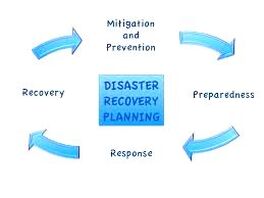
Current events dictate that it would be wise for every family to have a disaster recovery plan. Stuff happens all the time. Some of it not of your own creation. Whatever its source, it impacts you and forces you to regroup. What are you going to do when disaster strikes? How are you going to recover from it? One of the important aspects of financial capability is Protecting. You have worked hard to make gains to achieve financial well-being.
Resilience is an important part of financial well-being. As any world-champion prizefighter legendarily says, “it not just how hard a punch you threw; but also how hard a punch you took?” that matters. Being prepared and not just depending on luck or largesse to bail you out of a tight spot is a Money Smart Lifestyle. In the fight that is working-class financial life in 21st century America, a properly resourced emergency fund will help you absorb and recover from life's inevitable shocks. Your emergency fund can contain more than just cash. Prepping is a movement. The focus of this post is narrow. It is an overview discussion of food stores as a portion of an emergency fund, not a preppers guide. Prepper or not, it is prudent for every family to have a food security plan that anticipates disruptions. Also when properly integrated, a food store can become a cash flow resource. Let’s look at some basics. Types of disruptions where everybody is affected by the same catastrophe. You should be able to sustain your family for a minimum of 3-7 days in the event of a catastrophic event.
There is a chronic lack of cash when your income is routinely reduced through employment practices such as temporary layoffs, reduced hours, uneven or seasonal schedules, and lost hours due to unpaid sick or disability leave. Using a food store as part of your meal plan can reduce stress and the need for cash during such times. Types of disruptions where society collapses for 90+ days by a zombie apocalypse or whatever is beyond the scope of this blogpost. Besides, you won't be using Money anyway, but your food stores may have some barter value. Good luck. Here are some things to do to start prepping for disruptions. You don’t try to swallow the elephant in one bite, so to speak.
Make sure the plan works by rotating your stores regularly. Rehearse emergency situations before the emergency arises. These dry runs can be made into fun family activities. They will let you see where your plan needs tweaks. Can you really make 7 days of interesting meals using only your food store? Don’t wait until you have to do it to find out if you can. |
MONEYSMARTLIFE.ORG EMPOWERING SUSTAINABLE FINANCIAL WELL-BEING IN WORKING CLASS FAMILIES
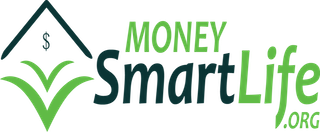
 RSS Feed
RSS Feed
